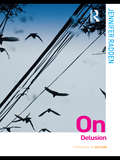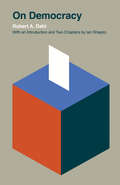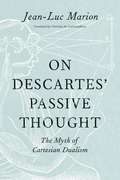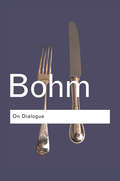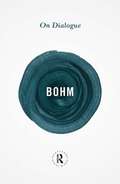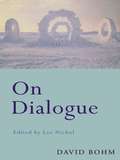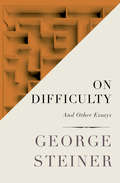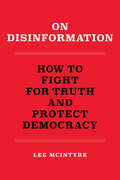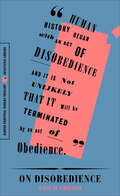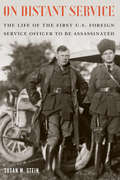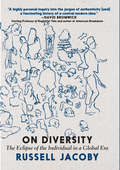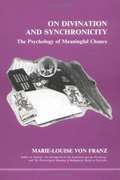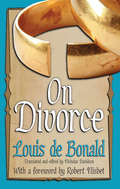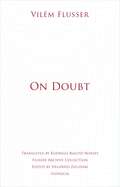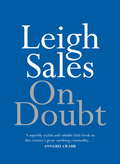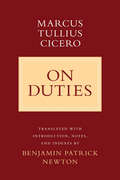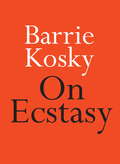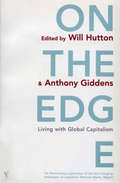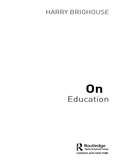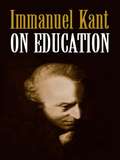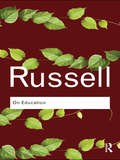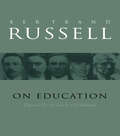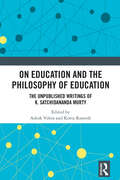- Table View
- List View
On Delusion (Thinking in Action)
by Jennifer RaddenDelusions play a fundamental role in the history of psychology, philosophy and culture, dividing not only the mad from the sane but reason from unreason. Yet the very nature and extent of delusions are poorly understood. What are delusions? How do they differ from everyday errors or mistaken beliefs? Are they scientific categories? In this superb, panoramic investigation of delusion Jennifer Radden explores these questions and more, unravelling a fascinating story that ranges from Descartes’s demon to famous first-hand accounts of delusion, such as Daniel Schreber’s Memoirs of My Nervous Illness. Radden places delusion in both a clinical and cultural context and explores a fascinating range of themes: delusions as both individually and collectively held, including the phenomenon of folies á deux; spiritual and religious delusions, in particular what distinguishes normal religious belief from delusions with religious themes; how we assess those suffering from delusion from a moral standpoint; and how we are to interpret violent actions when they are the result of delusional thinking. As well as more common delusions, such as those of grandeur, she also discusses some of the most interesting and perplexing forms of clinical delusion, such as Cotard and Capgras.
On Democracy: Second Edition (Veritas Paperbacks)
by Robert A. DahlWritten by the preeminent democratic theorist of our time, this book explains the nature, value, and mechanics of democracy. In a new introduction to this Veritas edition, Ian Shapiro considers how Dahl would respond to the ongoing challenges democracy faces in the modern world. “Within the liberal democratic camp there is considerable controversy about exactly how to define democracy. Probably the most influential voice among contemporary political scientists in this debate has been that of Robert Dahl.”—Marc Plattner, New York Times “An excellent introduction for novices, as well as a trusty handbook for experts and political science mavens.”—Publishers Weekly
On Descartes' Passive Thought: The Myth of Cartesian Dualism
by Jean-Luc Marion,On Descartes’ Passive Thought is the culmination of a life-long reflection on the philosophy of Descartes by one of the most important living French philosophers. In it, Jean-Luc Marion examines anew some of the questions left unresolved in his previous books about Descartes, with a particular focus on Descartes’s theory of morals and the passions. Descartes has long been associated with mind-body dualism, but Marion argues here that this is a historical misattribution, popularized by Malebranche and popular ever since both within the academy and with the general public. Actually, Marion shows, Descartes held a holistic conception of body and mind. He called it the meum corpus, a passive mode of thinking, which implies far more than just pure mind—rather, it signifies a mind directly connected to the body: the human being that I am. Understood in this new light, the Descartes Marion uncovers through close readings of works such as Passions of the Soul resists prominent criticisms leveled at him by twentieth-century figures like Husserl and Heidegger, and even anticipates the non-dualistic, phenomenological concepts of human being discussed today. This is a momentous book that no serious historian of philosophy will be able to ignore.
On Dialogue
by David BohmNever before has there been a greater need for deeper listening and more open communication to cope with the complex problems facing our organizations, businesses and societies. Renowned scientist David Bohm believed there was a better way for humanity to discover meaning and to achieve harmony. He identified creative dialogue, a sharing of assumptions and understanding, as a means by which the individual, and society as a whole, can learn more about themselves and others, and achieve a renewed sense of purpose.
On Dialogue (Routledge Great Minds)
by David BohmDavid Bohm is considered one of the best physicists of all time. He also had a deep interest in human communication and creativity. Influential in both management and communication theory in what is known 'Bohm Dialogue', On Dialogue is both inspiring and pioneering. Bohm considers the origin and very meaning of dialogue, reflecting on what gets in the way of "true dialogue". He argues that dialogue, as a radical form of exploration that allows different views to be presented, leads us beyond the impasse of conflict and argument to the forming of new views. With a new foreword by Dean Rickles.
On Dialogue (Routledge Great Minds Ser.)
by David BohmNever before has there been a greater need for deeper listening and more open communication to cope with the complex problems facing our organizations, businesses and societies. Renowned scientist David Bohm believed there was a better way for humanity to discover meaning and to achieve harmony. He identified creative dialogue, a sharing of assumptions and understanding, as a means by which the individual, and society as a whole, can learn more about themselves and others, and achieve a renewed sense of purpose.
On Difficulty: And Other Essays (Oxford Paperbacks Ser.)
by George SteinerA distinguished collection of essays on language, literature, and philosophy from acclaimed scholar and critic George SteinerOn Difficulty is as provocative and relevant today as when its essays were first published. Ranging from critical topics such as the understanding of language to the meaning of meaning, inward speech to the relationship between erotic sensibility and linguistic convention, these eight essays posit myriad topics for exploration and dialogue. George Steiner deals with considerations that are simultaneously literary and philosophical, exploring themes of linguistic privacy and the changing technical, physiological, and social statuses of the act of reading.
On Disinformation: How to Fight for Truth and Protect Democracy
by Lee McIntyreA powerful, pocket-sized citizen&’s guide on how to fight back against the disinformation campaigns that are imperiling American democracy, from the bestselling author of Post-Truth and How to Talk to a Science Denier.The effort to destroy facts and make America ungovernable didn&’t come out of nowhere. It is the culmination of seventy years of strategic denialism. In On Disinformation, Lee McIntyre shows how the war on facts began, and how ordinary citizens can fight back against the scourge of disinformation that is now threatening the very fabric of our society. Drawing on his twenty years of experience as a scholar of science denial, McIntyre explains how autocrats wield disinformation to manipulate a populace and deny obvious realities, why the best way to combat disinformation is to disrupt its spread, and most importantly, how we can win the war on truth.McIntyre takes readers through the history of strategic denialism to show how we arrived at this precarious political moment and identifies the creators, amplifiers, and believers of disinformation. Along the way, he also demonstrates how today&’s &“reality denial&” follows the same flawed blueprint of the &“five steps of science denial&” used by climate deniers and anti-vaxxers; shows how Trump has emulated disinformation tactics created by Russian and Soviet intelligence dating back to the 1920s; provides interviews with leading experts on information warfare, counterterrorism, and political extremism; and spells out the need for algorithmic transparency from Facebook, Twitter, and YouTube. On Disinformation lays out ten everyday practical steps that we can take as ordinary citizens—from resisting polarization to pressuring our Congresspeople to regulate social media—as well as the important steps our government (if we elect the right leaders) must take.Compact, easy-to-read (and then pass on to a friend), and never more urgent, On Disinformation does nothing less than empower us with the tools and knowledge needed to save our republic from autocracy before it is too late.
On Disobedience: 'why Freedom Means Saying No To Power (Harper Perennial Modern Thought Ser.)
by Erich Fromm“Human history began with an act of disobedience, and it is not unlikely that it will be terminated by an act of obedience.”—from On DisobedienceOne of the great psychological and social philosophers of the twentieth century, Erich Fromm expounded on the importance of disobedience and the authentic voice of the individual in modern culture. As relevant now as when it was first published, On Disobedience is a collection of provocative essays, including the title entry, which suggests the very act of dissent—the choice to refuse to conform, to speak "no" to those in power—is essential to a humane society, both to ensure humankind's preservation and to allow for one person to reclaim a genuine sense of self.In times of crisis, the great works of philosophy help us make sense of the world. This book is part of the Harper Perennial Resistance Library, a special five-book series highlighting short classic works of independent thought that illuminate the nature of truth, humanity's dangerous attraction to authoritarianism, the influence of media and mass communication, and the philosophy of resistance—all critical in understanding today's politically charged world.
On Dissent
by Ronald K. L. Collins David M. SkoverAmerica values dissent. It tolerates, encourages and protects it. But what is this thing we value? That is a question never asked. 'Dissent' is treated as a known fact. For all that has been said about it – in books, articles, judicial opinions, and popular culture – it is remarkable that no one has devoted much, if any, ink to explaining what dissent is. No one has attempted to sketch its philosophical, linguistic, legal or cultural meanings or usages. There is a need to develop some clarity about this phenomenon, for not every difference of opinion, symbolic gesture, public activity in opposition to government policy, incitement to direct action, revolutionary effort or political assassination need be tagged dissent. In essence, we have no conceptual yardstick. It is just that measure of meaning that On Dissent offers.
On Distant Service: The Life of the First U.S. Foreign Service Officer to Be Assassinated
by Susan M. SteinOn July 18, 1924, a mob in Tehran killed U.S. foreign service officer Robert Whitney Imbrie. His violent death, the first political murder in the history of the service, outraged the American people. Though Imbrie&’s loss briefly made him a cause célèbre, subsequent events quickly obscured his extraordinary life and career. Susan M. Stein tells the story of a figure steeped in adventure and history. Imbrie rejected a legal career to volunteer as an ambulance driver during World War I and joined the State Department when the United States entered the war. Assigned to Russia, he witnessed the October Revolution, fled ahead of a Bolshevik arrest order, and continued to track communist activity in Turkey even as the country&’s war of independence unfolded around him. His fateful assignment to Persia led to his death at age forty-one and set off political repercussions that cloud relations between the United States and Iran to this day. Drawing on a wealth of untapped materials, On Distant Service returns readers to an era when dash and diplomacy went hand-in-hand.
On Diversity: The Eclipse of the Individual in a Global Era
by Russell JacobyA brilliant examination of a timely concept from one of the nation's great public intellectuals.Diversity. You've heard the term everywhere--in the news, in the universities, at the television awards shows. Maybe even in the corporate world, where diversity initiatives have become de rigueur. But what does the term actually mean? Where does it come from? What are its intellectual precedents? Moreover, how do we square our love affair with diversity with the fact that the world seems to be becoming more and more, well, homogeneous? With a lucid, straightforward prose that rises above the noise, one of America's greatest intellectual gadflies, Russell Jacoby, takes these questions squarely on. Discussing diversity (or lack thereof) in language, fashion, childhood experience, political structure, and the history of ideas, Jacoby offers in plain language a surprising and penetrating analysis of our cultural moment. In an age where our public thinkers seem to be jumping over one another to have the latest correct opinion, Jacoby offers a most dangerous, and liberating, injunction: to stop and think.
On Divination and Synchronicity
by Marie-Louise von FranzJung's leading disciple studies synchronicity, or meaningful coincidences, using ancient oracular techniques and texts.
On Divorce (The\library Of Conservative Thought Ser.)
by Louis de BonaldOn Divorce is an anti-divorce treatise by Louis de Bonald, originally published in 1801 in response to the institution of divorce in France in the aftermath of the French Revolution. Examining the social structures of Christians, Jews, Asians, Greeks, and Romans, On Divorce links a theory of the family to a theory of politics and argues the family is a basic component of a stable society. As a politician, Bonald gave a crucial anti-divorce speech in the French legislature that summarized the argument of On Divorce. Due largely to Bonald's efforts, France abolished divorce in 1816.According to Bonald, human society is composed of three interactive societies: religious society, domestic society (the family), and public society (the state). These societies operate on common principles and can only be analyzed in relation to one another. Since, in this view, the family, not the individual, is the basic unit of society, divorce represents a fundamental assault on the social order.Bonald was one of the three principal founders of conservatism, along with Edmund Burke and Joseph de Maistre. Bonald's influence has been felt across the political spectrum and in areas as diverse as political theory, sociology, and literature. Of great interest to students of political philosophy, this work will be of equal value to those concerned with divorce and other social questions.
On Doubt (Univocal)
by Vilém FlusserIn On Doubt, Vilém Flusser refines Martin Heidegger&’s famous declaration that &“language is the dwelling of Being.&” For Flusser, &“the word is the dwelling of being,&” because in fact, in the beginning, there was the word. On Doubt is a treatise on the human intellect, its relation to language, and the reality-forming discourses that subsequently emerge. For Flusser, the faith that the modern age places in Cartesian doubt plays a role similar to the one that faith in God played in previous eras—a faith that needs to be challenged. Descartes doubts the world through his proposition cogito ergo sum, but leaves doubt itself untouched as indubitable and imperious. His cogito ergo sum may have proved to the Western intellect that thoughts exist, but it did not prove the existence of that which thinks: one can eliminate thinking and yet continue being. Therefore, should we not doubt doubt itself? Should we not try to go beyond this last step of Cartesian doubt and look for a new faith? The twentieth century has seen many attempts to defeat Cartesian doubt, however, this doubt of doubt has instead generated a complete loss of faith, which the West experiences as existential nihilism. Hence, the emergent emptying of values that results from such extreme doubt. Everything loses its meaning. Can this climate be overcome? Will the West survive the modern age?
On Doubt
by Leigh SalesAcclaimed journalist Leigh Sales has her doubts, and thinks you should, too.Her classic personal essay carries a message of truth, scrutiny and accountability-a much-needed pocket-sized antidote to fake news.Donald Trump, the post-truth world and the instability of Australian politics are all examined in this fresh take on her prescient essay on the media and political trends that define our times.
On Duties
by Marcus Tullius Cicero Benjamin Patrick NewtonBenjamin Patrick Newton's translation of Cicero's On Duties is the most complete edition of a text that has been considered a source of moral authority throughout classical, medieval, and modern times. Marcus Tullius Cicero was a preeminent Roman statesman, orator, and philosopher who introduced philosophy into Rome, and through Rome, into Christendom and the modern world. On Duties was championed by important thinkers including Thomas Aquinas, Montesquieu, and Voltaire, and it was one of the earliest books printed on the Gutenberg press.The true significance of On Duties lies in its examination of several fundamental problems of political philosophy, the most important being the possible conflict between the honorable and the useful. The honorable encompasses the virtues of human beings, which include justice and concern for the common good. The useful refers to the needs of living beings, which includes certain necessities and concern for private good. Only by understanding the possible conflict between these two sides of human nature, Cicero declares, may we understand our duties to our community and to ourselves. This new edition of On Duties aims to provide readers who cannot read Latin but wish to study the book with a literal yet elegant translation. It features an introduction, outline, footnotes, interpretative essay, glossary, and indexes, making Cicero's thought accessible to a general audience.
On Duties
by M. T. Griffin E. M. AtkinsDe Officiis (On Duties) is Cicero's last theoretical work and contains his analysis, in a Greek theoretical framework, of the political and ethical values of the Roman governing class in the late Republic. It has often been treated merely as a key to the Greek philosophical works that Cicero used, but this volume aims to render De Officiis, which had a profound impact upon subsequent political thinkers, more intelligible by explaining its relation to its own time and place. All the standard series features are present, including a wholly new translation, a concise introduction by a leading scholar, select bibliography, chronology, notes on vocabulary and brief biographies of the most prominent individuals mentioned in the text.
On Ecstasy
by Barrie Kosky'My polish grandmother made a chicken soup like no other chicken soup. To this day, it has, to my knowledge and experience, never been bettered ... Her chicken soup was the Caravaggio of soups. The Rainer Marie Rilke of soups. The Arturo Benedetti Michelangeli of soups.'A compelling and entertaining stoyteller, Barrie Kosky explores the feelings of intense joy and delight, as well as the power and terror that is ecstasy.
On The Edge
by Anthony GiddensCapitalism has become the universal social and economic order of our time. The capitalism of today, however, differs from that of previous eras; with intensifying globalisation, flexible organisations, and new forms of class divisions. Globalisation brings new possibilities, but also new risks, ranging from degradation of the environment to the concentrated control of the media. On the Edge comprises original essays by, among others, Polly Toynbee, Richard Senett and George Soros. They chart the contours of contemporary capitalism, analyse the role of the business firm, and consider whether the new capitalism is compatible with social cohesion and social justice. They discuss capitalism both as a form of culture and as an influence on daily life, and ask if capitalism has any viable rivals at the turn of the millennium.
On Education (Thinking in Action)
by Harry BrighouseWhat is education for? Should it produce workers or educate future citizens? Is there a place for faith schools - and should patriotism be taught? In this compelling and controversial book, Harry Brighouse takes on all these urgent questions and more. He argues that children share four fundamental interests: the ability to make their own judgements about what values to adopt; acquiring the skills that will enable them to become economically self-sufficient as adults; being exposed to a range of activities and experiences that will enable them to flourish in their personal lives; and developing a sense of justice. He criticises sharply those who place the interests of the economy before those of children, and assesses the arguments for and against the controversial issues of faith schools and the teaching of patriotism. Clearly argued but provocative, On Education draws on recent examples from Britain and North America as well as famous thinkers on education such as Aristotle and John Locke. It is essential reading for anyone interested in the present state of education and its future.
On Education
by Immanuel Kant"One of the greatest problems of education," Kant observes, "is how to unite submission to the necessary restraint with the child's capability of exercising his free will." He explores potential solutions to this dilemma, stressing the necessity of treating children as children and not as miniature adults. His positive outlook on the effects of education include a conviction that human nature could be continually improved; to achieve this end, he advocated that pedagogy, the science of education, be raised to academic status and studied at a university level -- an innovative notion for the 18th century.
On Education
by Bertrand RussellBertrand Russell is considered to be one of the most significant educational innovators of his time. In this influential and controversial work, Russell calls for an education that would liberate the child from unthinking obedience to parental and religious authority. He argues that if the basis of all education is knowledge wielded by love then society can be transformed. One of Bertrand Russell’s most definitive works, the remarkable ideas and arguments in On Education are just as insightful and applicable today as they were on first publication in 1926.
On Education and the Philosophy of Education: The Unpublished Writings of K. Satchidananda Murty
by Ashok Vohra Kotta RameshThis volume is a collection of K. Satchidananda Murty's unpublished writings. It presents Murty's views on the theory and praxis of education. Murty advocates for free universal education and presents a charter for education in the 21st Century which promotes higher studies in mathematics, science, and technology. He provides a comparative analysis of Western and Asian curriculums and explores the possibilities of introducing more courses on Eastern philosophy. The essays also tackle the teacher-student relationship, moral education, and discipline in the classroom. An important contribution, the book presents K. Satchidananda Murty's contribution to philosophy during sixty-one years of his engagement with active writing and teaching. It will be of great interest to scholars, teachers, and students of education, Indian philosophy, Asian Philosophy, comparative philosophy, religious studies, and South Asian studies.
